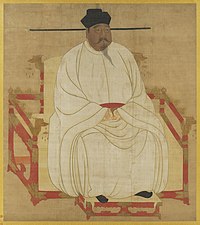Song Taizu
| Sòng Tàizǔ ( 宋太祖 ) | |
|---|---|
| Family name : | Zhào ( 趙 ) |
| First name : | Kuāngyìn ( 匡胤 ) |
| Major Age Name (Zi): | Yuanlang ( 元朗 ) |
|
Posthumous title : (complete) |
Emperor Qiyun Liji Yingwu Ruiwen Shende Shenggong Zhiming Daxiao ( 啓運 立 極 英武 睿 文 神 德 聖 功 至 明 大 孝 皇帝 ) |
| Temple name : | Tàizǔ ( 太祖 ) |
| Reign: | February 4, 960-14. November 976 |
| Era names : |
Jiànlóng ( 建隆 ) 960-963
Qiándé ( 乾 德 ) 963-968 Kāibǎo ( 開 寶 ) 968-976 |
Taizu ( Chinese 太祖 ; * March 21, 927 in Luoyang ; † November 14, 976 in Kaifeng ) was the founder and first emperor of the (Northern) Song Dynasty ( February 4, 960 ).
Zhao Kuangyin, the later ruler's maiden name, long served as a soldier and commander under the last emperors of the late Zhou dynasty Taizu and Shi Zong . Under the latter he rose to field marshal general, that is, to the highest military command. After the Zhou Army's initial defeats against the Northern Han Dynasty , Zhao recorded victories and became head of the Imperial Guard. After the death of Emperor Shi Zong, he pulled all commanders and generals together and became the new Emperor of China through a proclamation, which, as a loyal soldier, he was allegedly reluctant to accept . Zhao Kuangyin prevailed against Gongdi (952–960), the eight-year-old son of the late emperor. According to the history of the dynasty, Song Taizu demanded that his fellow putschists should not curl Gongdi. Bloodshed had the Taoist is a bad omen embossed Song Taizu. Gongdi lived for several years in the Song Taizu Imperial Palace in Kaifeng.
With the Song Dynasty founded by Zhao, the fragmentation of China in the 10th century (so-called Five Dynasties ) after the fall of the Tang Dynasty in 907 should end permanently. In addition, the new emperor conquered and united all the small southern states (Shu, Southern Han , Southern Tang). His hope of subjugating the strong northern states of the Han and Liao afterwards, however, was not to be fulfilled. Song Taizu also broke the power of the military governors, eliminated the separation of military and civil administration and placed the army directly under the central administration. He wanted to prevent someone - like him - from usurping the throne, which preoccupied him all his life. The additional coinage made to finance the increased military spending led to an increase in inflation and thus aggravated the economic situation.
Song Taizu founded academies and schools with largely unrestricted opportunities for discussion and the exchange of ideas - a first freedom of thought in the Middle Kingdom. The growth and spread of scientific progress, economic reforms and cultural and artistic achievements were thereby promoted or made possible in the first place. In addition, the emperor introduced the basis of the "Dynastic Rules and Politics of the Song", which should apply to the coming emperors. Furthermore, Song Taizu is said to have created a fighting style named after him and now modified worldwide, which is based on Shaolin techniques ( Chinese 太祖 長拳 , Pinyin Tàizǔ Chángquán - "Taizu's long fist").
literature
- Jacques Gernet : The Chinese World. The history of China from the beginning to the present time (= Suhrkamp-Taschenbuch. 1505). 1st edition, reprint. Suhrkamp, Frankfurt am Main 1997, ISBN 3-518-38005-2 .
- Roland Habersetzer : Bubishi. At the source of karatedô. 3rd, expanded edition. Rosewood, Chemnitz 2009, ISBN 978-3-938305-00-3 (With an analysis of the "32 forms of Emperor Song Taizu" (the original techniques of Tàizǔ Chángquán) by the martial arts experts Ōtsuka Tadahiko and Maik Albrecht ).
- Denis Twitchett , Paul Jakov Smith (eds.): The Sung Dynasty and its Precursors, 907-1279 (= The Cambridge History of China . Vol. 5, Part 1). Part 1. Cambridge University Press, Cambridge et al. 2009, ISBN 978-0-521-81248-1 .
| predecessor | Office | successor |
|---|---|---|
| Gongdi ( Late Zhou Dynasty ) |
Emperor of China ( Song Dynasty ) 960–976 |
Taizong |
| personal data | |
|---|---|
| SURNAME | Song Taizu |
| ALTERNATIVE NAMES | Zhao Kuangyin (maiden name) |
| BRIEF DESCRIPTION | Emperor of China, founder of the Song Dynasty |
| DATE OF BIRTH | March 21, 927 |
| PLACE OF BIRTH | Luoyang |
| DATE OF DEATH | November 14, 976 |
| Place of death | Kaifeng |
